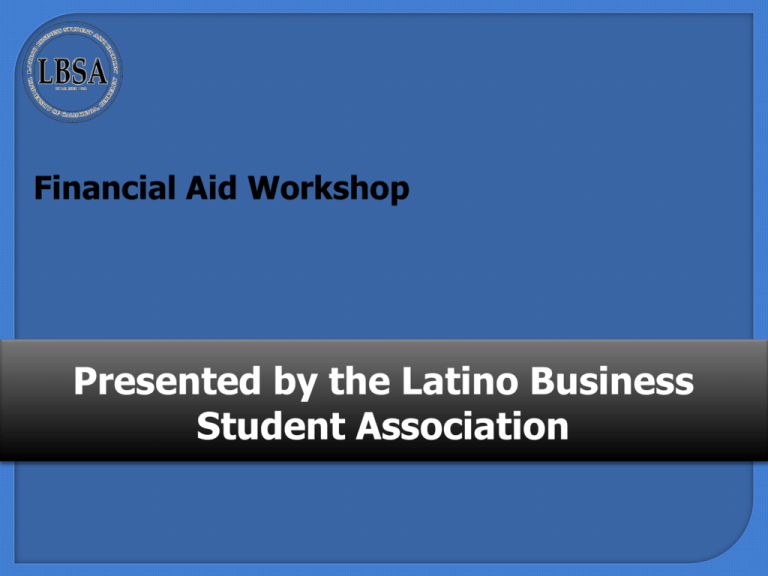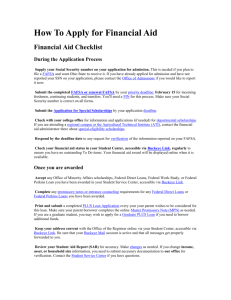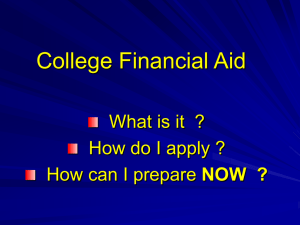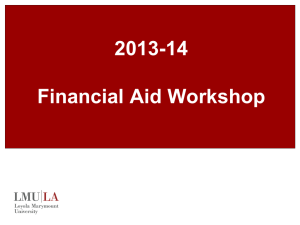CAL-GRANT - Latino Business Student Association
advertisement

Financial Aid Workshop Presented by the Latino Business Student Association Funds which are available to help pay the cost of higher education Funds are distributed in the following way: Free Money State, Federal, Private or Institutional Scholarships Work Study Offers need based students the opportunity to work in a job on or off campus to help pay their college costs Loans Funds available for students and/or parents which must be paid back Federal FAFSA (Universal Application) State Funding (CAL-GRANT) Universities/Colleges/Outside Agencies Money that does not have to be paid back Scholarships: Grants: Awarded on the basis of merit, skill, or a unique characteristic Money that does not have to be paid back Usually awarded on the basis of financial need Loans: Money students and parents borrow to help pay educational expenses Repayment usually begins after education is finished Only borrow what is really needed Look at loans as an investment in the future Employment: Allows student to earn money to help pay educational costs The GMS Scholarship Award Provides: • Support for the cost of education by covering unmet need and self-help; • Graduate school funding for continuing Gates Millennium Scholars in the areas of computer science, education, engineering, library science, mathematics, public health or science; • Leadership development programs with distinctive personal, academic and professional growth opportunities. Program Accomplishment: • Funded more than 13,000 Gates Millennium Scholars since the inception of the program • Obtained a 79.9% graduation rate in five years • Supported Gates Millennium Scholars enrolled in more than 1,500 colleges and universities • Graduated over 5,000 Gates Millennium Scholars since the program's inception • Five year retention rate of 87.7% Students are eligible to be considered for a GMS scholarship if they are: • African American, American Indian/Alaska Native, Asian and Pacific Islander American, or Hispanic American • Citizen/legal permanent resident of the United States • GPA of 3.3 • Enrolling for the first-time at a U.S. accredited college or university as a full-time student • Leadership, community service, extracurricular or other activities • Meet the Federal Pell Grant* eligibility criteria • Submit three forms: 1. Nominee Personal Information Form completed by the student. 2. Nominator Form completed by an educator familiar with the student’s academic record. #3. Recommender Form completed by a person familiar with the student’s leadership and community service • The Hispanic Scholarship Fund (HSF) is the nation's leading Hispanic scholarship organization, providing the Hispanic community more college scholarships and educational outreach support than any other organization in the country. • In its 34 year history, the Hispanic Scholarship Fund has awarded close to $280M in scholarships to more than 90,000 students in need. • Two-thirds of these students were the first in their families to go to college. • For the 2008-2009 academic year, 4,600 college bound Hispanic students were awarded scholarships worth $28M. • HSF scholars are high achievers and they have or are attending close to 2,000 of the nation’s diverse and academically rigorous colleges and universities in all 50 states, Puerto Rico, Guam and the U.S. Virgin Islands. UC Berkeley is one of those too!! APPLY for FAFSA (Free Application for Federal Student Aid) What is FAFSA??? Free Application for Federal Student Aid determines eligibility for: •Cal Grants •Pell Grants •Fee-waiver (BOG) •Work Study •Loans (subsidized and unsubsidized) www.fafsa.ed.gov Applying for FAFSA What do you need?? •Social Security Number •Driver’s License •Income Tax Returns (If haven’t filed them put estimated amount and GO BACK and update them once they are filed) •Create a Pin Number for student and parent (Same Pin number every time you apply) • 30 Minutes Deadline: March 2nd Keep a copy for your records! •Cal Grant A •Community College Reserve Grant •California Community College Transfer Entitlement Cal Grant •Cal Grant B What is a Cal Grant? • Awards that are state funded given to students to help pay for their college expenses. These awards do not have to be paid back. CAL-GRANT • Its only available for CALIFORNIA residents whom are enrolled and attending a college or university of CALIFORNIA Federal Grants Federal Pell Grant: •You don’t have to pay it back! •Offered to students who have not received their first Bachelors of Arts • $400 to $4,500 per year Cal Grant A •3.0 GPA, a California resident, must need financial assistance, and be attaining a first degree •CSU and UC Schools: up to $5,970 and $12,192 respectively •Private: up to $9,223 towards tuition and fees Cal Grant B •2.0 GPA, a California resident, must need financial assistance, be attaining a first degree, and first generation to attend college. First year = 1,473. Additional Years = Cal Grant A + $1,473 •Pays tuition and fees, books, living expenses, and transportation Cal Grant C •2.0 GPA, a California resident, must need financial assistance, and be attending vocational school •$547 for books, and up to $2,462 • Complete the Free Application for Federal Student Aid (FAFSA ) or California Dream Act Application (beginning in 2013) by March 2 every year • Complete the GPA Verification Form: must be certified by the high school and sent to the California Student Aid Commission -For high school seniors: check is your school does it for you already • Have a Social Security number or meet AB540 criteria • Be enrolled at least half time in college • If you were home-schooled or attended a charter school you must submit your ACT, SAT or GED score • If you have a GED, submit your GED score directly to the California Student Aid Commission. Are administered by the college and are for students with exceptional financial need. Loans with low interest rates (5%) available for students who demonstrate financial need The University or College is the loaner and you start paying the loan 9 months after you graduate or end school, which ever comes first Amount awarded is based on school’s budget SUBSIDIZED UNSUBSIDIZED PAYMENT STARTS 6 MONTHS AFTER THE LAST DAY OF ATTENDANCE AND... PAYMENT STARTS 6 MONTHS AFTER THE LAST DAY OF ATTENDANCE BUT... The federal government pays the interest on subsidized loans while you are in school and during the first six months after you graduate, withdraw, or enroll less than halftime. You’re responsible for paying interest that accrues OR let it accumulate while in college, but interest will be added to the amount you borrowed, and future interest will be based on the NEW higher loan amount. •Loans that may be borrowed by parents to pay their students education if the student is still dependent and is enrolled in the school at least half-time. •Loan is based on credit •Plus Loans are unsubsidized •PLUS loans have a variable interest rate, with a cap of 9 percent •Interest starts to accrue immediately, with repayment beginning within 60 days after the it is fully dispersed •“Plus” can be defermented while the student is attending school BUT the interest will accure •Interest Rate is low •Interest rates can be higher than most educational loans depending on the Borrower, credit history and job employment •Eligibility for loan is based on financial aid need/cost •Most private loans are deferrable but not all •Educational loans go into repayment 6 months after you graduate or stop attending school Loan Type Loan Fee In-School Repay Perkins 0% 0% 5% Sub 1.5% 0% 5.6%* Unsub 1.5% 6.8% 6.8% PLUS (Direct) 4% 7.9% 7.9% Interest rates for new loans are reset annually on July 1st 4 Year Universities Living on Campus CSU UC Private TOTAL: $23,430 $31,700 $40,411 Living with parents CSU UC Private TOTAL: $17,124 $28,600 $35,114 Median Annual Earnings of Adults Age 25 and Over (Full-Time Workers), 2011 Source: Bureau of Labor Statistics, Current Population Survey, Annual Social and Economic Supplement. Last Modified Date: March 23, 2012 • The CSU system is composed of 23 campuses • Admission offices use three factors to determine eligibility 1. Have completed A-G requirements with a C or better 2. High School G.P.A and SAT/ACT scores 3. High school diploma • The UC system is composed of 10 campuses • Requirements 1.Earn a grade point average (GPA) of 3.0 or better (3.4 if you're a nonresident) in A-G classes with no grade lower than a C. 2. Meet the examination requirement by taking the ACT Plus Writing or the SAT Reasoning Test by December of your Senior year This process takes time! Filling out the FAFSA and getting the required paperwork takes a while so give yourself PLENTY of time! Nobody is perfect... Make copies of all your paperwork, your Financial Aid information as well as your Applications for schools. Try not to worry! The money IS out there, your job is to find it! • Calgrants.org • Californiacolleges.edu • Fafsa.ed.gov • Fastweb.com • Finaid.org • Maldef.org • Scholarshare.com • Studentaid.ed.gov Thank you! We wish you the best in helping your kids save for college. It’s never too early. -From LBSA to you all Questions?





